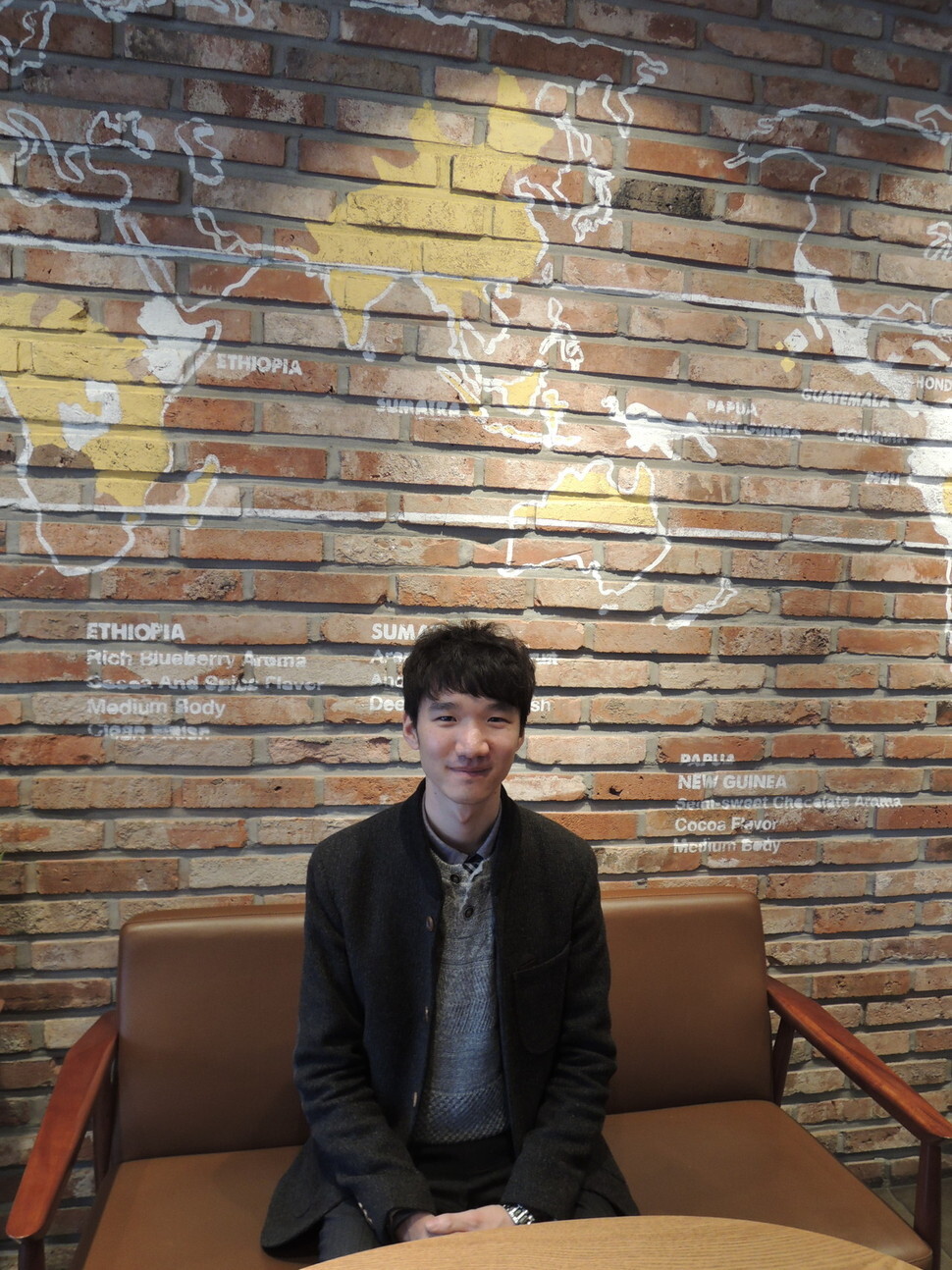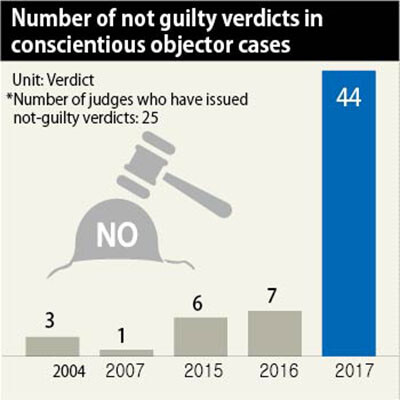hankyoreh
Links to other country sites 다른 나라 사이트 링크
Sharp rise in not guilty verdicts for conscientious objectors

First-trial courts acquitted 45 conscientious objectors in 44 cases last year involving refusal to report for mandatory military service or reserves training for reasons of religious faith or pacifism, a Jan. 14 examination showed. Last year’s cases accounted for the majority of 61 not-guilty rulings for conscientious objectors to military service since the first such verdict in 2004. Many are now watching to see if the Constitutional Court, Supreme Court, National Assembly, and administration adopt a more forward-thinking approach this year to suit the changing climate.
Observers are already ranking 2017 as a year of significant changes in the way courts have ruled on conscientious objection cases. Hon. Judge Lee Jeong-ryeol of Seoul Nambu District Court delivered the first acquittal in May 2004 for conscientious objectors who had refused to report for military service or reserves training for religious reasons. But the next acquittal amounted to a single case in 2007. Another eight years passed before another not-guilty ruling was made.
Analysts said the situation was influenced by the social climate at the time, with an en banc guilty verdict by the Supreme Court on July 15, 2004, two Constitutional Court decisions upholding the constitutionality of mandatory military service in 2004 and 2011, and the Lee Myung-bak administration’s withdraw of plans for an alternative service system in 2008.

But the situation has been changing since six acquittals were produced eight years later in 2015. The year 2016 brought seven not-guilty rulings, including the first three ever in appellate judgments. In 2017, nineteen judges wrote not-guilty verdicts in 44 cases involving 45 conscientious objectors.
“At first, I thought it was an issue for the Constitutional Court to decide and recommended a constitutionality ruling,” explained one judge who acquitted a conscientious objectors.
“But with the Constitutional Court’s position unlikely to change, there’s been growing support behind the idea that judges should acquit if they determine there are legitimate grounds for refusal to perform military service.”
Even courts that do not acquit are increasingly deciding to defer judgment until a Constitutional Court ruling. Acquittals of conscientious objectors have developed in terms of quality as well as quantity over the past year. Article 88-1 of the Military Service Act states that men face up to three years in prison for failure to report for service without legitimate grounds.
In response, judges have argued that legitimate grounds for conscientious objection do exist with the freedom of conscience provisions in Article 19 of the Constitution, interpretation of international human rights norms, and the failure to institute an alternative to mandatory military service. Hon. Judge Kang Jae-won of Jeju District Court assembled the full domestic and overseas debate on the issue for the longest yet acquittal ruling, a 60-page document issued on Aug. 11 of last year.
“State exists for the sake of the individual”
“I believe that the interpretation recognizing the supremacy of decisions of personal conscience is the right one for these times, in accordance with the basic principles of liberal democracy holding that the state exists for the sake of the individual and not the other way around,” Kang concluded.
Other acquittal judgments stressed the principles of criminal trials. In a ruling on Dec. 20 of last year, Hon. Judge Ahn Jae-hoon of Ulsan District Court went point by point through the investigation report, statements, and other evidence provided by prosecutors.
“The Military Service Act requires prosecutors to prove there are ‘no legitimate grounds for refusal,’ and there is no evidence that is recognizable as such,” Ahn determined.
Ahn also said that the “mechanical processing of cases according to Supreme Court rulings and Constitutional Court decisions is a practice that must be remedied.”
Despite the steady stream of first-trial acquittals, the National Assembly, administration, Supreme Court, and Constitutional Court remain intransigent. Last year, the Supreme Court upheld 15 guilty rulings against conscientious objectors. But many are now watching the Constitutional Court closely following remarks made in a recent Law Times interview by court president Hon. Lee Jin-sung.
“The time has come for us to give an answer on the matter of conscientious objection to military service. There are nine Justices, and I think we should make a priority of resolving this,” Lee was quoted as saying.
By Kim Min-kyung, staff reporter
Please direct questions or comments to [english@hani.co.kr]

Editorial・opinion
![[Guest essay] The real reason Korea’s new right wants to dub Rhee a founding father [Guest essay] The real reason Korea’s new right wants to dub Rhee a founding father](https://flexible.img.hani.co.kr/flexible/normal/500/300/imgdb/original/2024/0423/8317138574257878.jpg) [Guest essay] The real reason Korea’s new right wants to dub Rhee a founding father
[Guest essay] The real reason Korea’s new right wants to dub Rhee a founding father![[Column] ‘Choson’: Is it time we start referring to N. Korea in its own terms? [Column] ‘Choson’: Is it time we start referring to N. Korea in its own terms?](https://flexible.img.hani.co.kr/flexible/normal/500/300/imgdb/original/2024/0423/3617138579390322.jpg) [Column] ‘Choson’: Is it time we start referring to N. Korea in its own terms?
[Column] ‘Choson’: Is it time we start referring to N. Korea in its own terms?- [Editorial] Japan’s rewriting of history with Korea has gone too far
- [Column] The president’s questionable capacity for dialogue
- [Column] Are chaebol firms just pizza pies for families to divvy up as they please?
- [Column] Has Korea, too, crossed the Rubicon on China?
- [Correspondent’s column] In Japan’s alliance with US, echoes of its past alliances with UK
- [Editorial] Does Yoon think the Korean public is wrong?
- [Editorial] As it bolsters its alliance with US, Japan must be accountable for past
- [Guest essay] Amending the Constitution is Yoon’s key to leaving office in public’s good graces
Most viewed articles
- 1[Column] ‘Choson’: Is it time we start referring to N. Korea in its own terms?
- 2Senior doctors cut hours, prepare to resign as government refuses to scrap medical reform plan
- 3[Guest essay] The real reason Korea’s new right wants to dub Rhee a founding father
- 4Why Korea shouldn’t welcome Japan’s newly beefed up defense cooperation with US
- 5Opposition calls Yoon’s chief of staff appointment a ‘slap in the face’
- 6New AI-based translation tools make their way into everyday life in Korea
- 7Terry Anderson, AP reporter who informed world of massacre in Gwangju, dies at 76
- 8[Column] The clock is ticking for Korea’s first lady
- 9Samsung barricades office as unionized workers strike for better conditions
- 10Korean government’s compromise plan for medical reform swiftly rejected by doctors